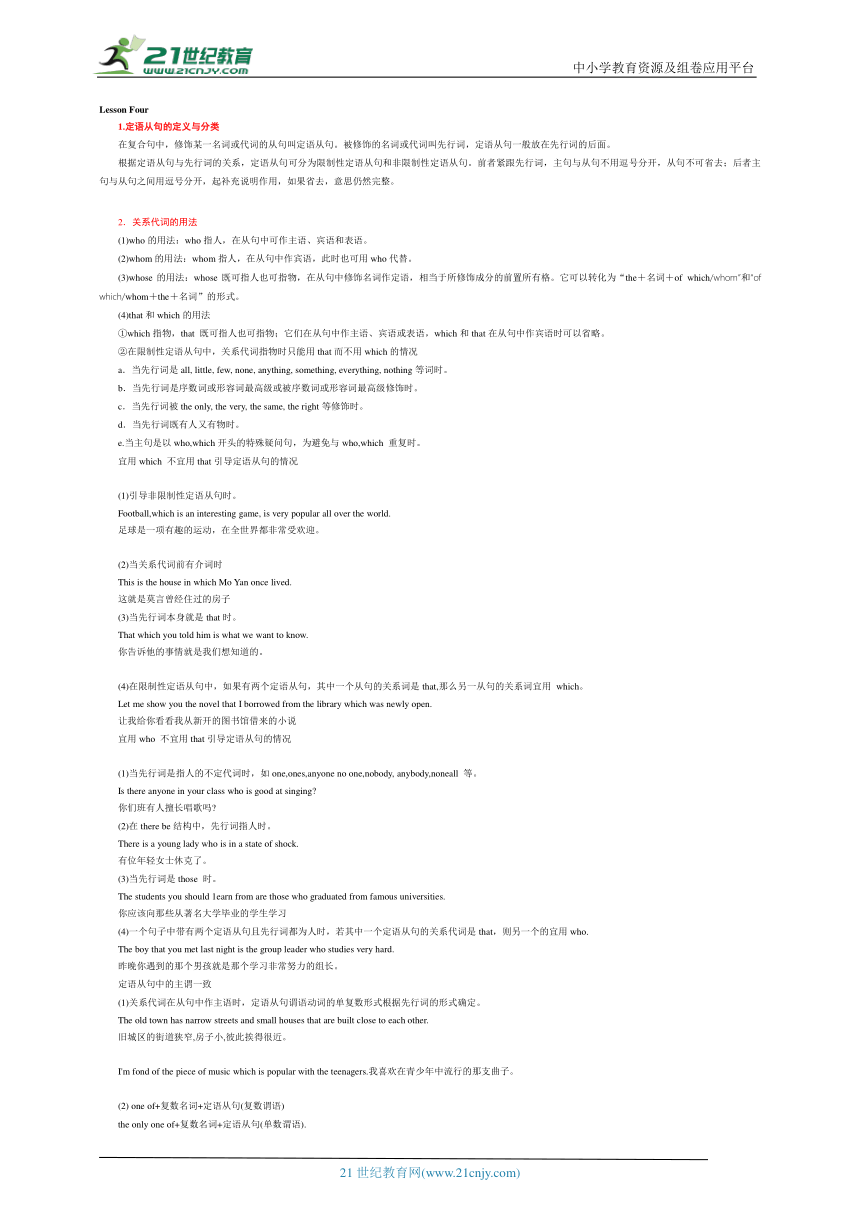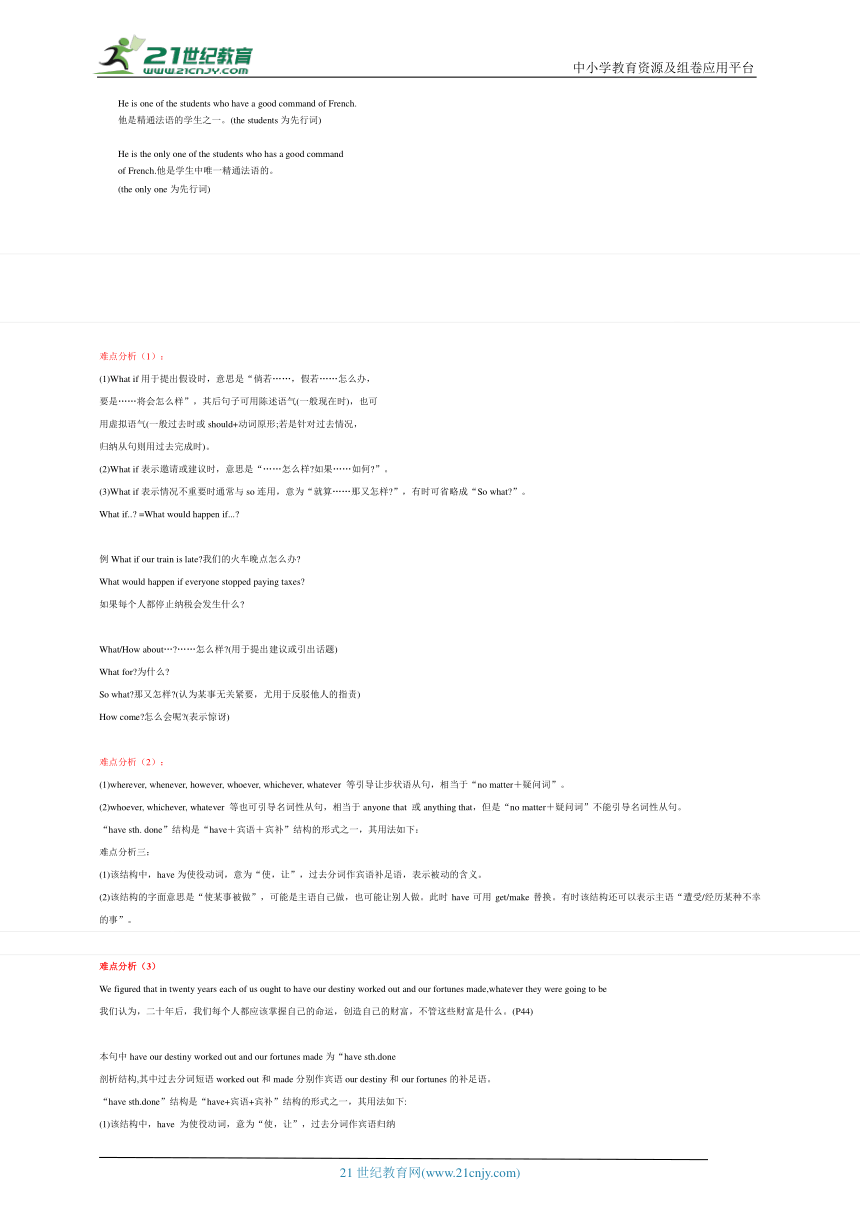新外研版必修一Module Four Friends forever 语法精讲
文档属性
| 名称 | 新外研版必修一Module Four Friends forever 语法精讲 |

|
|
| 格式 | doc | ||
| 文件大小 | 280.3KB | ||
| 资源类型 | 试卷 | ||
| 版本资源 | 外研版(2019) | ||
| 科目 | 英语 | ||
| 更新时间 | 2024-05-08 15:45:06 | ||
图片预览


文档简介
中小学教育资源及组卷应用平台
Lesson Four
1.定语从句的定义与分类
在复合句中,修饰某一名词或代词的从句叫定语从句。被修饰的名词或代词叫先行词,定语从句一般放在先行词的后面。
根据定语从句与先行词的关系,定语从句可分为限制性定语从句和非限制性定语从句。前者紧跟先行词,主句与从句不用逗号分开,从句不可省去;后者主句与从句之间用逗号分开,起补充说明作用,如果省去,意思仍然完整。
2.关系代词的用法
(1)who的用法:who指人,在从句中可作主语、宾语和表语。
(2)whom的用法:whom指人,在从句中作宾语,此时也可用who代替。
(3)whose的用法:whose既可指人也可指物,在从句中修饰名词作定语,相当于所修饰成分的前置所有格。它可以转化为“the+名词+of which/whom”和“of which/whom+the+名词”的形式。
(4)that和which的用法
①which指物,that 既可指人也可指物;它们在从句中作主语、宾语或表语,which和that在从句中作宾语时可以省略。
②在限制性定语从句中,关系代词指物时只能用that而不用which的情况
a.当先行词是all, little, few, none, anything, something, everything, nothing等词时。
b.当先行词是序数词或形容词最高级或被序数词或形容词最高级修饰时。
c.当先行词被the only, the very, the same, the right等修饰时。
d.当先行词既有人又有物时。
e.当主句是以who,which开头的特殊疑问句,为避免与who,which 重复时。
宜用which 不宜用that引导定语从句的情况
(1)引导非限制性定语从句时。
Football,which is an interesting game, is very popular all over the world.
足球是一项有趣的运动,在全世界都非常受欢迎。
(2)当关系代词前有介词时
This is the house in which Mo Yan once lived.
这就是莫言曾经住过的房子
(3)当先行词本身就是that时。
That which you told him is what we want to know.
你告诉他的事情就是我们想知道的。
(4)在限制性定语从句中,如果有两个定语从句,其中一个从句的关系词是that,那么另一从句的关系词宜用 which。
Let me show you the novel that I borrowed from the library which was newly open.
让我给你看看我从新开的图书馆借来的小说
宜用who 不宜用that引导定语从句的情况
(1)当先行词是指人的不定代词时,如one,ones,anyone no one,nobody, anybody,noneall 等。
Is there anyone in your class who is good at singing
你们班有人擅长唱歌吗
(2)在there be结构中,先行词指人时。
There is a young lady who is in a state of shock.
有位年轻女士休克了。
(3)当先行词是those 时。
The students you should 1earn from are those who graduated from famous universities.
你应该向那些从著名大学毕业的学生学习
(4)一个句子中带有两个定语从句且先行词都为人时,若其中一个定语从句的关系代词是that,则另一个的宜用who.
The boy that you met last night is the group leader who studies very hard.
昨晚你遇到的那个男孩就是那个学习非常努力的组长。
定语从句中的主谓一致
(1)关系代词在从句中作主语时,定语从句谓语动词的单复数形式根据先行词的形式确定。
The old town has narrow streets and small houses that are built close to each other.
旧城区的街道狭窄,房子小,彼此挨得很近。
I'm fond of the piece of music which is popular with the teenagers.我喜欢在青少年中流行的那支曲子。
(2) one of+复数名词+定语从句(复数谓语)
the only one of+复数名词+定语从句(单数谓语).
He is one of the students who have a good command of French.
他是精通法语的学生之一。(the students为先行词)
He is the only one of the students who has a good command
of French.他是学生中唯一精通法语的。
(the only one为先行词)
归纳 拓展 难点分析一:
难点分析(1):
(1)What if用于提出假设时,意思是“倘若……,假若……怎么办,
要是……将会怎么样”,其后句子可用陈述语气(一般现在时),也可
用虚拟语气(一般过去时或should+动词原形;若是针对过去情况,
归纳从句则用过去完成时)。
(2)What if表示邀请或建议时,意思是“……怎么样 如果……如何 ”。
(3)What if表示情况不重要时通常与so连用,意为“就算……那又怎样 ”,有时可省略成“So what ”。
What if.. =What would happen if...
例What if our train is late 我们的火车晚点怎么办
What would happen if everyone stopped paying taxes
如果每个人都停止纳税会发生什么
What/How about… ……怎么样 (用于提出建议或引出话题)
What for 为什么
So what 那又怎样 (认为某事无关紧要,尤用于反驳他人的指责)
How come 怎么会呢 (表示惊讶)
难点分析(2):
(1)wherever, whenever, however, whoever, whichever, whatever 等引导让步状语从句,相当于“no matter+疑问词”。
(2)whoever, whichever, whatever 等也可引导名词性从句,相当于anyone that 或anything that,但是“no matter+疑问词”不能引导名词性从句。
“have sth. done”结构是“have+宾语+宾补”结构的形式之一,其用法如下:
难点分析三:
(1)该结构中,have为使役动词,意为“使,让”,过去分词作宾语补足语,表示被动的含义。
(2)该结构的字面意思是“使某事被做”,可能是主语自己做,也可能让别人做。此时have可用get/make替换。有时该结构还可以表示主语“遭受/经历某种不幸的事”。
(3)“have+宾语+宾补”结构中,宾补
难点分析(3)
We figured that in twenty years each of us ought to have our destiny worked out and our fortunes made,whatever they were going to be
我们认为,二十年后,我们每个人都应该掌握自己的命运,创造自己的财富,不管这些财富是什么。(P44)
本句中have our destiny worked out and our fortunes made为“have sth.done
剖析结构,其中过去分词短语worked out和made分别作宾语our destiny和our fortunes的补足语。
“have sth.done”结构是“have+宾语+宾补”结构的形式之一,其用法如下:
(1)该结构中,have 为使役动词,意为“使,让”,过去分词作宾语归纳
补足语,表示被动的含义。拓展
(2)该结构的字面意思是“使某事被做”,可能是主语自己做,也可
能让别人做。此时have可用get/make替换。有时该结构还可以表示
主语“遭受/经历某种不幸的事”。
难点分析(4)
keep in mind that...记住……
教材例句:
But we need to keep in mind that what we see on social media is often not the whole truth about a person.
但我们需要谨记,我们在社交媒体上看到的,往往不是一个人的全部真面目。
keep in mind that...也可写作bear in mind that...,
是keep/bear….in mind 的变式,that引导宾语从句。
例
Keep in mind that the price does not include flights.
记住:这个价格不包括机票。
make up one's mind
下定决心;作出决定
make up one's mind to do sth.下定决心做某事
change ones mind改变主意
with...in mind考虑到……
难点分析(5)
the way + 定语从句
教材例句
Although technology has changed the way we acquire friends, the meaning of friendship and our longing for friends remain the same.
尽管技术已经改变了我们结交朋友的方式,友情的意义和我们对友谊的渴望依然不变。
way作“方式,方法”讲,后接定语从句:
①关系词在从句中作状语时,关系词用that,in which 或省略;
②关系词在从句中作主语或宾语时,关系词用that或which(作宾语时关系词可省略)。
例 The way(that/in which) he did it attracted me.
他做这件事的方式吸引了我。
I did it in the way(that/which)you told me.
我是按照你告诉我的方式做的。
way(方式,方法)后的定语:
way to do sth.
way of doing sth.
难点分析(6)
be to do 结构:
教材例句:
The next morning I was to start for the West to make my fortune.第二天一早,我就要去西部赚大钱了。
be to do 结构的常见用法:
1.表示按计划,安排即将发生某事。
They are to be married in October.
他们打算10月结婚。
2.表示应该做什么,也表示命令、禁止、义务或可能性,接近于should,must,have to 等.
When am I to come 我该什么时候来
No one is to leave the building任何人不得离开大楼。
3.表示注定要发生的事。
Better days are soon to follow.好日子很快就会到来。
难点分析(7)
couldn't/can’t have done sth.不可能做过某事
教材例句:
You couldn’t have dragged Jimmy out of New York; he thought it was the only place on earth.可你没法把吉米拖出纽约,他觉得地球上只有(纽约)这么一个地方。
could/can have done表示对过去情况的推测,一般用于否定句或疑问句。
I couldn’t have left it on the bus.
我不可能把它落在公共汽车上了。
Could I have left it on the bus
我可能把它落在公共汽车上了吗
could have done可表示与过去事实相反的假设,意为“过去本可以/本能够做而实际上未做”。
I could have won the game but decided to let her win.
我本可以赢得那场比赛,但还是决定让她赢。
may/might have done sth.可能做过某事
must have done sth.一定做过某事
21世纪教育网 www.21cnjy.com 精品试卷·第 2 页 (共 2 页)
21世纪教育网(www.21cnjy.com)
Lesson Four
1.定语从句的定义与分类
在复合句中,修饰某一名词或代词的从句叫定语从句。被修饰的名词或代词叫先行词,定语从句一般放在先行词的后面。
根据定语从句与先行词的关系,定语从句可分为限制性定语从句和非限制性定语从句。前者紧跟先行词,主句与从句不用逗号分开,从句不可省去;后者主句与从句之间用逗号分开,起补充说明作用,如果省去,意思仍然完整。
2.关系代词的用法
(1)who的用法:who指人,在从句中可作主语、宾语和表语。
(2)whom的用法:whom指人,在从句中作宾语,此时也可用who代替。
(3)whose的用法:whose既可指人也可指物,在从句中修饰名词作定语,相当于所修饰成分的前置所有格。它可以转化为“the+名词+of which/whom”和“of which/whom+the+名词”的形式。
(4)that和which的用法
①which指物,that 既可指人也可指物;它们在从句中作主语、宾语或表语,which和that在从句中作宾语时可以省略。
②在限制性定语从句中,关系代词指物时只能用that而不用which的情况
a.当先行词是all, little, few, none, anything, something, everything, nothing等词时。
b.当先行词是序数词或形容词最高级或被序数词或形容词最高级修饰时。
c.当先行词被the only, the very, the same, the right等修饰时。
d.当先行词既有人又有物时。
e.当主句是以who,which开头的特殊疑问句,为避免与who,which 重复时。
宜用which 不宜用that引导定语从句的情况
(1)引导非限制性定语从句时。
Football,which is an interesting game, is very popular all over the world.
足球是一项有趣的运动,在全世界都非常受欢迎。
(2)当关系代词前有介词时
This is the house in which Mo Yan once lived.
这就是莫言曾经住过的房子
(3)当先行词本身就是that时。
That which you told him is what we want to know.
你告诉他的事情就是我们想知道的。
(4)在限制性定语从句中,如果有两个定语从句,其中一个从句的关系词是that,那么另一从句的关系词宜用 which。
Let me show you the novel that I borrowed from the library which was newly open.
让我给你看看我从新开的图书馆借来的小说
宜用who 不宜用that引导定语从句的情况
(1)当先行词是指人的不定代词时,如one,ones,anyone no one,nobody, anybody,noneall 等。
Is there anyone in your class who is good at singing
你们班有人擅长唱歌吗
(2)在there be结构中,先行词指人时。
There is a young lady who is in a state of shock.
有位年轻女士休克了。
(3)当先行词是those 时。
The students you should 1earn from are those who graduated from famous universities.
你应该向那些从著名大学毕业的学生学习
(4)一个句子中带有两个定语从句且先行词都为人时,若其中一个定语从句的关系代词是that,则另一个的宜用who.
The boy that you met last night is the group leader who studies very hard.
昨晚你遇到的那个男孩就是那个学习非常努力的组长。
定语从句中的主谓一致
(1)关系代词在从句中作主语时,定语从句谓语动词的单复数形式根据先行词的形式确定。
The old town has narrow streets and small houses that are built close to each other.
旧城区的街道狭窄,房子小,彼此挨得很近。
I'm fond of the piece of music which is popular with the teenagers.我喜欢在青少年中流行的那支曲子。
(2) one of+复数名词+定语从句(复数谓语)
the only one of+复数名词+定语从句(单数谓语).
He is one of the students who have a good command of French.
他是精通法语的学生之一。(the students为先行词)
He is the only one of the students who has a good command
of French.他是学生中唯一精通法语的。
(the only one为先行词)
归纳 拓展 难点分析一:
难点分析(1):
(1)What if用于提出假设时,意思是“倘若……,假若……怎么办,
要是……将会怎么样”,其后句子可用陈述语气(一般现在时),也可
用虚拟语气(一般过去时或should+动词原形;若是针对过去情况,
归纳从句则用过去完成时)。
(2)What if表示邀请或建议时,意思是“……怎么样 如果……如何 ”。
(3)What if表示情况不重要时通常与so连用,意为“就算……那又怎样 ”,有时可省略成“So what ”。
What if.. =What would happen if...
例What if our train is late 我们的火车晚点怎么办
What would happen if everyone stopped paying taxes
如果每个人都停止纳税会发生什么
What/How about… ……怎么样 (用于提出建议或引出话题)
What for 为什么
So what 那又怎样 (认为某事无关紧要,尤用于反驳他人的指责)
How come 怎么会呢 (表示惊讶)
难点分析(2):
(1)wherever, whenever, however, whoever, whichever, whatever 等引导让步状语从句,相当于“no matter+疑问词”。
(2)whoever, whichever, whatever 等也可引导名词性从句,相当于anyone that 或anything that,但是“no matter+疑问词”不能引导名词性从句。
“have sth. done”结构是“have+宾语+宾补”结构的形式之一,其用法如下:
难点分析三:
(1)该结构中,have为使役动词,意为“使,让”,过去分词作宾语补足语,表示被动的含义。
(2)该结构的字面意思是“使某事被做”,可能是主语自己做,也可能让别人做。此时have可用get/make替换。有时该结构还可以表示主语“遭受/经历某种不幸的事”。
(3)“have+宾语+宾补”结构中,宾补
难点分析(3)
We figured that in twenty years each of us ought to have our destiny worked out and our fortunes made,whatever they were going to be
我们认为,二十年后,我们每个人都应该掌握自己的命运,创造自己的财富,不管这些财富是什么。(P44)
本句中have our destiny worked out and our fortunes made为“have sth.done
剖析结构,其中过去分词短语worked out和made分别作宾语our destiny和our fortunes的补足语。
“have sth.done”结构是“have+宾语+宾补”结构的形式之一,其用法如下:
(1)该结构中,have 为使役动词,意为“使,让”,过去分词作宾语归纳
补足语,表示被动的含义。拓展
(2)该结构的字面意思是“使某事被做”,可能是主语自己做,也可
能让别人做。此时have可用get/make替换。有时该结构还可以表示
主语“遭受/经历某种不幸的事”。
难点分析(4)
keep in mind that...记住……
教材例句:
But we need to keep in mind that what we see on social media is often not the whole truth about a person.
但我们需要谨记,我们在社交媒体上看到的,往往不是一个人的全部真面目。
keep in mind that...也可写作bear in mind that...,
是keep/bear….in mind 的变式,that引导宾语从句。
例
Keep in mind that the price does not include flights.
记住:这个价格不包括机票。
make up one's mind
下定决心;作出决定
make up one's mind to do sth.下定决心做某事
change ones mind改变主意
with...in mind考虑到……
难点分析(5)
the way + 定语从句
教材例句
Although technology has changed the way we acquire friends, the meaning of friendship and our longing for friends remain the same.
尽管技术已经改变了我们结交朋友的方式,友情的意义和我们对友谊的渴望依然不变。
way作“方式,方法”讲,后接定语从句:
①关系词在从句中作状语时,关系词用that,in which 或省略;
②关系词在从句中作主语或宾语时,关系词用that或which(作宾语时关系词可省略)。
例 The way(that/in which) he did it attracted me.
他做这件事的方式吸引了我。
I did it in the way(that/which)you told me.
我是按照你告诉我的方式做的。
way(方式,方法)后的定语:
way to do sth.
way of doing sth.
难点分析(6)
be to do 结构:
教材例句:
The next morning I was to start for the West to make my fortune.第二天一早,我就要去西部赚大钱了。
be to do 结构的常见用法:
1.表示按计划,安排即将发生某事。
They are to be married in October.
他们打算10月结婚。
2.表示应该做什么,也表示命令、禁止、义务或可能性,接近于should,must,have to 等.
When am I to come 我该什么时候来
No one is to leave the building任何人不得离开大楼。
3.表示注定要发生的事。
Better days are soon to follow.好日子很快就会到来。
难点分析(7)
couldn't/can’t have done sth.不可能做过某事
教材例句:
You couldn’t have dragged Jimmy out of New York; he thought it was the only place on earth.可你没法把吉米拖出纽约,他觉得地球上只有(纽约)这么一个地方。
could/can have done表示对过去情况的推测,一般用于否定句或疑问句。
I couldn’t have left it on the bus.
我不可能把它落在公共汽车上了。
Could I have left it on the bus
我可能把它落在公共汽车上了吗
could have done可表示与过去事实相反的假设,意为“过去本可以/本能够做而实际上未做”。
I could have won the game but decided to let her win.
我本可以赢得那场比赛,但还是决定让她赢。
may/might have done sth.可能做过某事
must have done sth.一定做过某事
21世纪教育网 www.21cnjy.com 精品试卷·第 2 页 (共 2 页)
21世纪教育网(www.21cnjy.com)
